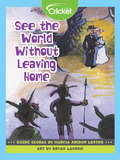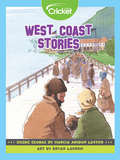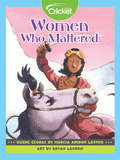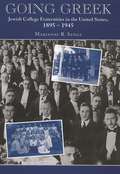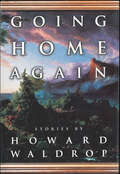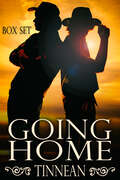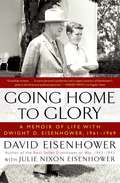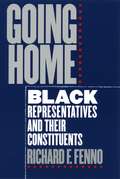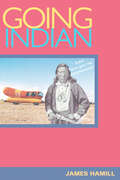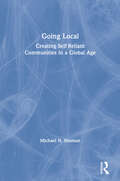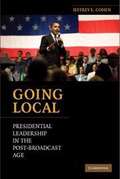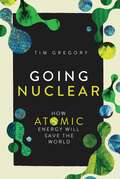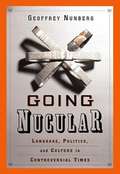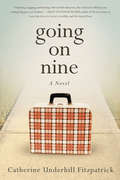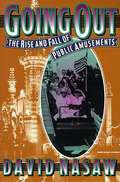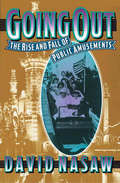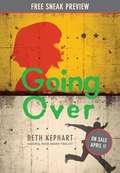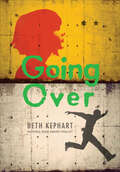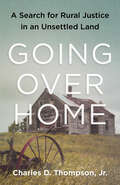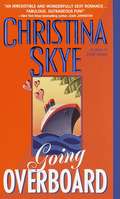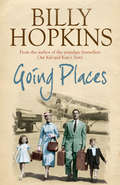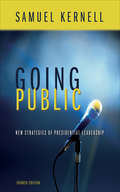- Table View
- List View
Going Global: See the World Without Leaving Home
by Marcia Amidon LustedBefore radio, television, and movies, expositions or world fairs such as the World's Columbian Exposition, the 1901 Pan-American Exposition, and the St. Louis World's Fair offered glimpses into faraway cultures and people.
Going Global: West Coast Stories
by Marcia Amidon LustedThe majority of immigrants who passed through Angel Island Immigration Station in the early 20th century came from China and Japan, but large groups also came from a few other nations.
Going Global: Women Who Mattered
by Marcia Amidon LustedThe Revolutionary War created an opportunity for American women to have an impact on the changing world around them. Here's a look at some other women who filled important roles in their respective countries during the same time period.
Going Greek: Jewish College Fraternities in the United States, 1895-1945 (American Jewish Civilization Series)
by Marianne R. SanuaGoing Greek offers an unprecedented look at the relationship between American Jewish students and fraternity life during its heyday in the first half of the twentieth century. More than secret social clubs, fraternities and sororities profoundly shaped the lives of members long after they left college-often dictating choices in marriage as well as business alliances. Widely viewed as a key to success, membership in these self-governing, sectarian organizations was desirable but not easily accessible, especially to non-Protestants and nonwhites. In Going Greek Marianne Sanua examines the founding of Jewish fraternities in light of such topics as antisemitism, the unique challenges faced by Jewish students on campuses across the United States, responses to World War II, and questions pertaining to assimilation and/or identity reinforcement.
Going Home Again: Stories
by Howard WaldropThe words "inimitable" and "unique" are bandied about too often in artistic circles, so much so that critics seem to have forgotten those words were invented to describe Howard Waldrop's fiction.Waldrop's mastery of arcane knowledge, his transcendent wit, and the way his stories explode like cheerty bombs inside a reader's mind have all made Howard Waldrop one of the most beloved writers of the past two decades. Readers who encounter his work never forget the experience, and this new collection compiles nine such experiences (heretofore uncollected), including:"Flatfeet!", a madcap tour of this century's first decades, courtesy of the Keystone Kops."Ocean's Ducks," an homage to those brave black actors of the 1930s. Remember those "Little Moron" jokes in the schoolyard, like "Why did the Little Moron throw the clock out the window?" "He wanted to see Time fly." Now ask yourself again "Why Did?"And beware the masked Mexican wrestlers of "El Castillo de la Perserverancia"!Howard Waldrop's unique and inimitable talents are on full display here. Read on, marvel, and rejoice.
Going Home Box Set
by TinneanThis two-book box set from best-selling M/M author Tinnean contains two historical western novels. Contains the stories:Home Before Sundown: It’s a few years after the Civil War, and George Pettigrew has learned his family is in danger. He’ll do anything to protect them, including wearing a dress. It’s already duped the bad guys, but how will the man he loves react to seeing him in skirts?Two for Home: Zachary “Sharps” Browne and Lieutenant Steve Marriott meet during the Civil War and become friends in spite of battles, troublemakers, and their age difference. After the war, Steve becomes a wagon master, while Sharps works to help heal the recovering nation. When they reunite, will their friendship survive to become more, or will the dangers of the time cause them to be parted forever?
Going Home To Glory: A Memoir of Life with Dwight D. Eisenhower, 1961-1969
by David Eisenhower Julie Nixon EisenhowerWhen President Dwight Eisenhower left Washington, D.C., at the end of his second term, he retired to a farm in historic Gettysburg, Pennsylvania, that he had bought a decade earlier. Living on the farm with the former president and his wife, Mamie, were his son, daughter-in-law, and four grandchildren, the oldest of whom, David, was just entering his teens. In this engaging and fascinating memoir, David Eisenhower--whose previous book about his grandfather, Eisenhower at War, 1943-1945, was a finalist for the Pulitzer Prize--provides a uniquely intimate account of the final years of the former president and general, one of the giants of the twentieth century. In Going Home to Glory, Dwight Eisenhower emerges as both a beloved and forbidding figure. He was eager to advise, instruct, and assist his young grandson, but as a general of the army and president, he held to the highest imaginable standards. At the same time, Eisenhower was trying to define a new political role for himself. Ostensibly the leader of the Republican party, he was prepared to counsel his successor, John F. Kennedy, who sought instead to break with Eisenhower's policies. (In contrast, Kennedy's successor, Lyndon Johnson, would eagerly seek Eisenhower's advice.) As the tumultuous 1960s dawned, with assassinations, riots, and the deeply divisive war in Vietnam, plus a Republican nominee for president in 1964 whom Eisenhower considered unqualified, the former president tried to chart the correct course for himself, his party, and the country. Meanwhile, the past continued to pull on him as he wrote his memoirs, and publishers and broadcasters asked him to reminisce about his wartime experiences. When his grandfather took him on a post-presidential tour of Europe, David saw firsthand the esteem with which monarchs, prime ministers, and the people of Europe held the wartime hero. Then as later, David was under the watchful eye of a grandfather who had little understanding of or patience with the emerging rock 'n' roll generation. But even as David went off to boarding school and college, grandfather and grandson remained close, visiting and corresponding frequently. David and Julie Nixon's romance brought the two families together, and Eisenhower strongly endorsed his former vice-president's successful run for the presidency in 1968. With a grandson's love and devotion but with a historian's candor and insight, David Eisenhower has written a remarkable book about the final years of a great American whose stature continues to grow.
Going Home to Glory: A Memoir of Life with Dwight D. Eisenhower, 1961-1969
by David Eisenhower Julie Nixon EisenhowerWhen President Dwight Eisenhower left Washington, D.C., at the end of his second term, he retired to a farm in historic Gettysburg, Pennsylvania, that he had bought a decade earlier. Living on the farm with the former president and his wife, Mamie, were his son, daughter-in-law, and four grandchildren, the oldest of whom, David, was just entering his teens. In this engaging and fascinating memoir, David Eisenhower--whose previous book about his grandfather, Eisenhower at War, 1943-1945, was a finalist for the Pulitzer Prize--provides a uniquely intimate account of the final years of the former president and general, one of the giants of the twentieth century. In Going Home to Glory, Dwight Eisenhower emerges as both a beloved and forbidding figure. He was eager to advise, instruct, and assist his young grandson, but as a general of the army and president, he held to the highest imaginable standards. At the same time, Eisenhower was trying to define a new political role for himself. Ostensibly the leader of the Republican party, he was prepared to counsel his successor, John F. Kennedy, who sought instead to break with Eisenhower's policies. (In contrast, Kennedy's successor, Lyndon Johnson, would eagerly seek Eisenhower's advice.) As the tumultuous 1960s dawned, with assassinations, riots, and the deeply divisive war in Vietnam, plus a Republican nominee for president in 1964 whom Eisenhower considered unqualified, the former president tried to chart the correct course for himself, his party, and the country. Meanwhile, the past continued to pull on him as he wrote his memoirs, and publishers and broadcasters asked him to reminisce about his wartime experiences. When his grandfather took him on a post-presidential tour of Europe, David saw firsthand the esteem with which monarchs, prime ministers, and the people of Europe held the wartime hero. Then as later, David was under the watchful eye of a grandfather who had little understanding of or patience with the emerging rock 'n' roll generation. But even as David went off to boarding school and college, grandfather and grandson remained close, visiting and corresponding frequently. David and Julie Nixon's romance brought the two families together, and Eisenhower strongly endorsed his former vice-president's successful run for the presidency in 1968. With a grandson's love and devotion but with a historian's candor and insight, David Eisenhower has written a remarkable book about the final years of a great American whose stature continues to grow.
Going Home: Black Representatives And Their Constituents
by Richard F. FennoThirty years ago there were nine African Americans in the U. S. House of Representatives. Today there are four times that number. In Going Home, the dean of congressional studies, Richard F. Fenno, explores what representation has meant--and means today--to black voters and to the politicians they have elected to office. Fenno follows the careers of four black representatives--Louis Stokes, Barbara Jordan, Chaka Fattah, and Stephanie Tubbs Jones--from their home districts to the halls of the Capitol. He finds that while these politicians had different visions of how they should represent their districts (in part based on their individual preferences, and in part based on the history of black politics in America), they shared crucial organizational and symbolic connections to their constituents. These connections, which draw on a sense of "linked fates," are ones that only black representatives can provide to black constituents. His detailed portraits and incisive analyses will be important for anyone interested in the workings of Congress or in black politics.
Going Indian
by James HamillGoing Indian explores Indian (as opposed to tribal) ethnic identity among Native American people in Oklahoma through their telling, in their own words, of how they became Indian and what being Indian means to them today. Divided into four parts, the book features Oklahoma Indians' constructions of their histories and their view of today's native populations, their experiences with forced removals and Indian educational institutions, the meaning they place on blood quantum and ancestry in relation to Indian identity, and their practice of religion in Native churches. James Hamill makes extensive use of the Indian Pioneer and Doris Duke material at the University of Oklahoma's Western History Library to assemble these narratives, using interviews collected between 1937-38 and 1967-70, as well as interviews he conducted from 2000 to 2001. While most books on Native American people in Oklahoma focus on tribes and their histories, Hamill instead explores the use of Indian symbolism across a wide field of experience to reveal what they thought and what they think about these various issues, and how these have influenced and affected their self-perceptions over time.
Going Local: Creating Self-Reliant Communities in a Global Age
by Michael ShumanNational drug chains squeeze local pharmacies out of business, while corporate downsizing ships jobs overseas. All across America, communities large and small are losing control of their economies to outside interests. Going Local shows how some cities and towns are fighting back. Refusing to be overcome by Wal-Marts and layoffs, they are taking over abandoned factories, switching to local produce and manufactured goods, and pushing banks to loan money to local citizens. Shuman details how dozens of communities are recapturing their own economies with these new strategies, investing not in outsiders but in locally owned businesses.
Going Local: Presidential Leadership in the Post-Broadcast Age
by Jeffrey E. CohenGoing public to gain support, especially through reliance on national addresses and the national news media, has been a central tactic for modern presidential public leadership. In Going Local: Presidential Leadership in the Post-Broadcast Age, Jeffrey E. Cohen argues that presidents have adapted their going-public activities to reflect the current realities of polarized parties and fragmented media. Going public now entails presidential targeting of their party base, interest groups, and localities. Cohen focuses on localities and offers a theory of presidential news management that is tested using several new data sets, including the first large-scale content analysis of local newspaper coverage of the president. The analysis finds that presidents can affect their local news coverage, which, in turn, affects public opinion toward the president. Although the post-broadcast age presents hurdles to presidential leadership, Going Local demonstrates the effectiveness of targeted presidential appeals and provides us with a refined understanding of the nature of presidential leadership.
Going Nuclear: How Atomic Energy Will Save the World
by Tim GregoryA bold, provocative, and knowledgable case for the importance of nuclear science and how nuclear power is essential to reaching net zero.What if net zero is not an environmental challenge, but an energy challenge? In this visionary book, Dr. Tim Gregory challenges prevailing narratives around climate change, arguing that the goal of net zero is not simply to replace fossil fuels with renewables, but to power civilisation using sources of energy that do not emit carbon dioxide. He unequivocally shows that only one emissions-free energy source can rise to that challenge: nuclear power Going Nuclear calls for decarbonisation to be the twenty-first century's Apollo programme, illuminating the far-reaching potential of the atom beyond clean energy to advanced medicine, forensics, atomic gardening and interplanetary exploration. By interweaving scientific optimism, myth-busting data and ambitious policy, Gregory offers an alternative nuclear future that can meet the shared goal of environmental stewardship and continued human progress.
Going Nucular: Language, Politics, and Culture in Confrontational Times
by Geoffrey NunbergNunberg (linguistics, Stanford U.) does not spend much time on the romance of words or decrying the state of the language, but more often takes language as a jumping off point to see what words can reveal about other things, among them culture, war, politics, symbols, media, business, and technology. Many of the 65 essays began life as articles or radio commentaries.
Going On Nine: A Novel
by Catherine Underhill FitzpatrickIn the summer of 1956, a girl goes in search of freedom: &“Chronicles a time of great change in America . . . will keep you reading long past your bedtime.&” —Kelly O&’Connor McNees, author of The Island of Doves A child swipes her mother&’s engagement ring, snatches her sister&’s brand-new nightgown, and runs outside to play &“bride.&” She soon loses the ring, rips the gown, and, when she gets caught, decides it&’s time to pack her suitcase and make a run for it. When the policeman brings her home that night, her parents&’ reaction isn&’t what she expected. In fact, they tell her to try living at some of her friends&’ houses in their little St. Louis suburb, so she can find a better family… What happens next is a summer-long journey in which Grace Mitchell rides shotgun in a Plymouth Belvedere, hunkers in the back of a rattletrap vegetable truck, crawls into a crumbling tunnel, dresses up with a prom queen, and keeps vigil in the bedroom of a molestation victim. There are reasons why Grace remembers the summer of 1956 for the rest of her life. Those are just a few. Through the eyes of a child and the mature woman she becomes, we make the journey with Grace and discover important truths about life, equality, family, and the soul-searching quest for belonging.
Going Out: The Rise and Fall of Public Amusements
by David NasawDavid Nasaw has written a sparkling social history of twentieth-century show business and of the new American public that assembled in the city's pleasure palaces, parks, theaters, nickelodeons, world's fair midways, and dance halls. The new amusement centers welcomed women, men, and children, native-born and immigrant, rich, poor and middling. Only African Americans were excluded or segregated in the audience, though they were overrepresented in parodic form on stage. This stigmatization of the African American, Nasaw argues, was the glue that cemented an otherwise disparate audience, muting social distinctions among "whites," and creating a common national culture.
Going Out: The Rise and Fall of Public Amusements
by David NasawDavid Nasaw has written a sparkling social history of twentieth-century show business and of the new American public that assembled in the city's pleasure palaces, parks, theaters, nickelodeons, world's fair midways, and dance halls. The new amusement centers welcomed women, men, and children, native-born and immigrant, rich, poor and middling. Only African Americans were excluded or segregated in the audience, though they were overrepresented in parodic form on stage. This stigmatization of the African American, Nasaw argues, was the glue that cemented an otherwise disparate audience, muting social distinctions among "whites," and creating a common national culture.
Going Over
by Beth KephartIt is February 1983, and Berlin is a divided city with a miles-long barricade separating east from west. But the city isn't the only thing that is divided. Ada lives among the rebels, punkers, and immigrants of Kreuzberg in West Berlin. Stefan lives in East Berlin, in a faceless apartment bunker of Friedrichshain. Bound by love and separated by circumstance, their only chance for a life together lies in a high-risk escape. But will Stefan find the courage to leap? Or will forces beyond his control stand in his way? National Book Award finalist Beth Kephart presents a story of daring and sacrifice, and love that will not wait.
Going Over
by Beth KephartIt is February 1983, and Berlin is a divided city with a miles-long barricade separating east from west. But the city isn't the only thing that is divided. Ada lives among the rebels, punkers, and immigrants of Kreuzberg in West Berlin. Stefan lives in East Berlin, in a faceless apartment bunker of Friedrichshain. Bound by love and separated by circumstance, their only chance for a life together lies in a high-risk escape. But will Stefan find the courage to leap? Or will forces beyond his control stand in his way? National Book Award finalist Beth Kephart presents a story of daring and sacrifice, and love that will not wait.
Going Over Home: A Search for Rural Justice in an Unsettled Land
by Jr., Charles Thompson"Going Over Home is a call that inspires the reader to stand shoulder to shoulder with family farmers in their daily struggle."—Willie NelsonAn intimate portrait of the joys and hardships of rural life, as one man searches for community, equality, and tradition in AppalachiaCharles D. Thompson, Jr. was born in southwestern Virginia into an extended family of small farmers. Yet as he came of age he witnessed the demise of every farm in his family. Over the course of his own life of farming, rural education, organizing, and activism, the stories of his home place have been his constant inspiration, helping him identify with the losses of others and to fight against injustices. In Going Over Home, Thompson shares revelations and reflections, from cattle auctions with his grandfather to community gardens in the coal camps of eastern Kentucky, racial disparities of white and Black landownership in the South to recent work with migrant farm workers from Latin America. In this heartfelt first-person narrative, Thompson unpacks our country&’s agricultural myths and addresses the history of racism and wealth inequality and how they have come to bear on our nation&’s rural places and their people.Booklist Editors&’ Choice &“Best Books of 2019&”
Going Overboard (SEAL and Code Name #2)
by Christina SkyeCarolina Sullivan needs a man's body bad. . . . Only the most gorgeous hunk will save fast-track photographer Carly Sullivan's job, but finding the right man isn't easy when you're on a ship in the middle of the Caribbean and the model you hired turns out to be a disaster. With her hopes sinking faster than the "Titanic, Carly spots the most beautiful man she's ever seen. Ford McKay swears he's a rancher from Wyoming, but Carly has her suspicions. Then all hell breaks loose in their island paradise and the sexy stranger is all that protects Carly from a hail of bullets. Ford McKay knows that mixing business and pleasure can be murder, and he's not about to compromise his current mission for an obstinate redhead who can't forget her camera for a nanosecond. But when Carly is wounded, the rugged Navy SEAL can't just walk away. As fate forces the two into excruciatingly close quarters, Ford finds his heart taking a tumble. Soon the straight-arrow SEAL discovers that with the right woman, going overboard can be unforgettable.
Going Places (The Hopkins Family Saga, Book 5): An endearing account of bringing up a family in the 1950s
by Billy HopkinsThe Hopkins family embark on the biggest adventure of their lives... Billy Hopkins' Going Places is a fictionalised autobiography of family life in 1950s Manchester and Kenya. Perfect for fans of Lyn Andrews and Nadine Dorries. 'Going Places is the story of a family dealing with their dreams, new challenges and heartaches, and is sure to capture the imagination of all readers' - Huddersfield Daily ExaminerIt's 1950, and when Laura and Billy Hopkins return to Manchester from their honeymoon, they're in seventh heaven despite the austerity that has been going on since World War II. But the euphoria gradually evaporates and they settle into a penny-pinching existence on Billy's teaching salary, as babies and bills appear with alarming regularity. When Billy spots an advertisement for Education Officers in Kenya, it sounds like the answer to all their prayers, despite worries about the Mau Mau rebellion and the omnipresence of dangerous creatures. After much family debate, Laura, Billy and the junior Hopkins set off to Nairobi on a BOAC Argonaut and start on the biggest adventure of their lives...What readers are saying about Going Places: 'This author has a rare gift; he can have you laughing then virtually reduce you to tears, such is his power of communication''Packed with warmth, humour anda keen understanding of life''A really lively and refreshing read'
Going Places: An endearing account of bringing up a family in the 1950s (Hopkins Family Saga #5)
by Billy HopkinsThe Hopkins family embark on the biggest adventure of their lives... Billy Hopkins' Going Places is a fictionalised autobiography of family life in 1950s Manchester and Kenya. Perfect for fans of Lyn Andrews and Nadine Dorries. 'Going Places is the story of a family dealing with their dreams, new challenges and heartaches, and is sure to capture the imagination of all readers' - Huddersfield Daily Examiner It's 1950, and when Laura and Billy Hopkins return to Manchester from their honeymoon, they're in seventh heaven despite the austerity that has been going on since World War II. But the euphoria gradually evaporates and they settle into a penny-pinching existence on Billy's teaching salary, as babies and bills appear with alarming regularity. When Billy spots an advertisement for Education Officers in Kenya, it sounds like the answer to all their prayers, despite worries about the Mau Mau rebellion and the omnipresence of dangerous creatures. After much family debate, Laura, Billy and the junior Hopkins set off to Nairobi on a BOAC Argonaut and start on the biggest adventure of their lives... What readers are saying about Going Places: 'This author has a rare gift; he can have you laughing then virtually reduce you to tears, such is his power of communication''Packed with warmth, humour and a keen understanding of life''A really lively and refreshing read'
Going Public im Deutschen Reich: Die Börseneinführungstätigkeit von Aktien im Zeitraum 1917 bis 1945
by Patrick KozikDie seit Anfang der 1980er Jahre bestehende intensive Forschung zu Börseneinführungen am deutschen Kapitalmarkt ermöglicht zuverlässige Forschungsresultate für die Zeiträume 1870 bis 1914 sowie ab dem Jahr 1948. Eine vollständige IPO-Zeitreihe für die dazwischenliegenden Jahre konnte bisher nicht präsentiert werden. Diese bestehende Forschungslücke wird nunmehr geschlossen, indem mit dem vorliegenden Buch erstmals eine vollständige Zeitreihe von Börseneinführungen für den Zeitraum 1917 bis 1945 vorgelegt wird. Zusätzlich ist es in Zusammenstellung mit bisherigen Forschungsreihen erstmalig möglich, eine lückenlose Zeitreihe von Börseneinführungen seit der Reichsgründung 1871 bis zur heutigen Börsenentwicklung zu erhalten. Darüber hinaus leistet dieser Band einen Beitrag zur Beschreibung der historischen Börsenorganisation, zur Validierung bestehender Modellansätze unter Berücksichtigung ökonomischer und politischer Schocks sowie den Nachweis positiver Emissionsrenditen für die Zwischenkriegsjahre.
Going Public: New Strategies of Presidential Leadership
by Samuel H. KernellPresidents are uniquely positioned to promote themselves and their polices directly to the public. Using sympathetic crowds as a backdrop, a president can rally public opinion to his side, along the way delivering a subtle yet unmistakable message to his intended audience in Congress. Samuel Kernell shows how “going public” remains a potent weapon in the president’s arsenal, both for advancing his own agenda and blocking initiatives from his political adversaries in Congress.In his highly anticipated fourth edition, Kernell delivers thorough analysis and detailed background on how this strategy continues to evolve given the intense polarization of Congress and the electorate as well as changes in communications technology. He considers the implications of both factors—especially in combination—on the future of presidential leadership and weighs the lessons of 9/11 on “going public” in foreign affairs.
